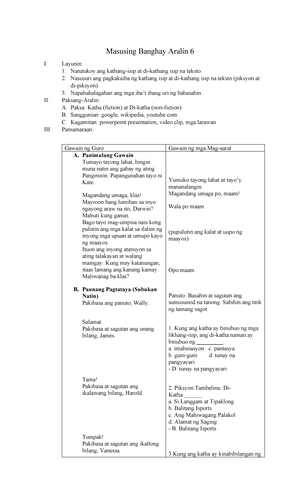- Information
- AI Chat
Was this document helpful?
Costas
Course: Elementary Education (BEED1)
585 Documents
Students shared 585 documents in this course
University: Philippine Normal University - North Luzon
Was this document helpful?

Costa’s'Levels'of'Questioning'
!
To!better!understand!the!content!being!presented!in!their!core!subject!areas,!it!is!essential!for!students!
to!learn!to!think!critically!and!to!ask!higher!levels!of!questions.!By!asking!higher!levels!of!questions,!
students!deepen!their!knowledge!and!create!connections!to!the!material!being!presented,!which!in!turn!
prepares!them!for!the!inquiry!that!occurs!in!tutorials.!Students!need!to!be!familiar!with!Costa’s!(and/or!
Bloom’s)!levels!of!questioning!to!assist!them!in!formulating!and!identifying!higher!levels!of!questions.!
!
Directions:!Read!the!poem!below!and!review!the!“Three!House!Story”!on!the!next!page.!Both!set!the!
stage!for!Costa’s!Levels!of!Questioning.!!
!
One3Two3Three'Story'Intellect'Poem'
There!are!oneMstory!intellects,!
twoMstory!intellects,!
and!threeMstory!intellects!with!skylights.!
All!fact!collectors!who!have!
no!aim!beyond!their!facts!
are!oneMstory!people.!
TwoMstory!people!compare,!reason,!
generalize,!using!the!labor!of!
fact!collectors!as!their!own.!
ThreeMstory!people!idealize,!
imagine,!predict—their!best!illumination!
comes!through!the!skylight.!
!
Adapted!from!a!quotation!by!Oliver!Wendell!Holmes!
!
The'Three3Story'House'
Level!1!(the!lowest!level)!requires!one!to!gather!information.!
Level!2!(the!middle!level)!requires!one!to!process!the!information.!
Level!3!(the!highest!level)!requires!one!to!apply!the!information.!
!
3—Applying!
Evaluate!Generalize!Imagine!
Judge!Predict!Speculate!
If/Then!Hypothesize!Forecast!
!
2—Processing!
Compare!Contrast!Classify!
Sort!Distinguish!Explain!(Why?)!
Infer!Analyze!
!
1—Gathering!
Complete!Define!Describe!
Identify!List!Observe!
Recite!Select!
!





